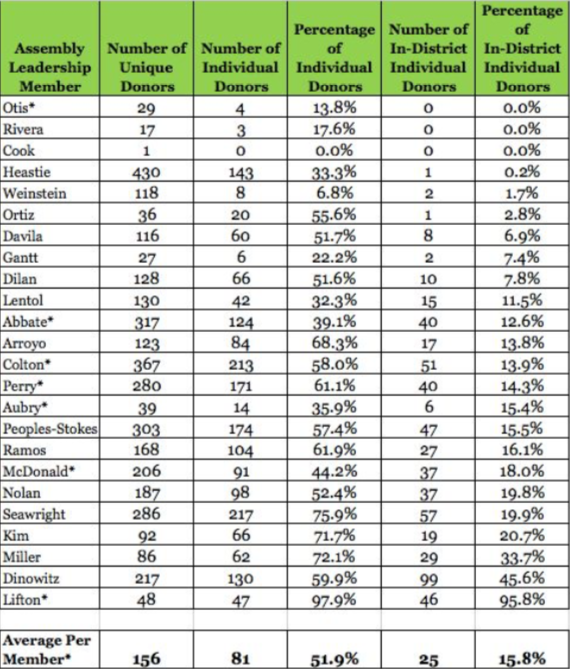Report: Assembly Leaders Get Few Contributions From People in Districts. Heastie – One In District Human Donor
Only 16% Of Campaign Donations Assembly Leadership Receives Are From People In Their Districts
Speaker Heastie Had One In-District Human Donor; Ways & Means Chair Weinstein Two; Members Otis, Cook, And Rivera Had ZERO
Clear Need For Small Donor Public Matching System
The 24 members of Assembly leadership have raised very few donations from actual human beings living in their districts, according to a Reinvent Albany analysis of itemized campaign contributions available in the New York Open Government portal. Assembly members with leadership titles raised just 16 percent of their contributions last election cycle (2017-18) from in-district residents. Nearly half of their contributions were from corporations, associations, and unions – many doing business with state government.
Speaker Carl Heastie collected donations from 430 contributors for his candidate committee, but just one from a person living in his district. Ways & Means Chair Helene Weinstein had only two individual donors from her district and just eight human beings who donated to her campaign out of 118 contributors. Members Vivian Cook, Steven Otis and Jose Rivera reported zero in-district individual donors.
Reinvent Albany is part of the Fair Elections coalition advocating for passage of a public financing system modeled on New York City’s that matches small dollar contributions to encourage fundraising from everyday New Yorkers. A public financing system would enable elected officials and candidates to rely more on constituents in their districts, rather than companies and organizations, to raise funds for campaigns.
Some Assembly leaders actively fundraised in their districts. Barbara Lifton, representing Ithaca and surrounding communities, was the top in-district fundraiser, bringing in 96 percent of her itemized donations from people in her district. Crystal Peoples-Stokes and N. Nick Perry, representing Buffalo and East Flatbush respectively, each raised 40 or more individual contributions in-district, showing small-donor fundraising is feasible in communities of color and less prosperous areas of the state. Peoples-Stokes had the fourth highest number of in-district individual donations, and Perry the sixth.
The constituent-based fundraising practices of these leaders would be incentivized under a public financing system like New York City’s, which matches donations from ordinary New Yorkers. Research by the Campaign Finance Institute shows virtually all elected officials would raise more funds under a public matching system than they do currently without one.
The chart on the next page shows fundraising by Assembly leaders for the 2017-2018 election cycle, ranked from worst to first by percentage of in-district individual donors (the far right column):

* – indicates Assemblymember did not itemize all contributions. Contributions from donors giving $99 or less can be grouped together and reported as “Total Unitemized Contributions,” meaning the donors and amounts given are anonymous. Reinvent Albany’s analysis is based only on itemized contributions. Members with unitemized contributions have more contributions from people and may have more in-district individual contributions. However, this is impossible to determine from public records.
John McDonald reported $5,189 in unitemized individual contributions in 2017-2018. Barbara Lifton reported $5,131;Peter Abbate reported $2,165; N. Nick Perry reported $,1550; Jeffrion Aubry reported $1,055; and Steven Otis reported $50. We will adjust this analysis if members report their unitemized anonymous contributions.
In the 2019-2020 budget, the Governor and legislature created a Public Financing Commission that will establish a binding public financing program by December first, unless its proposed program is amended by the legislature afterwards.
The Commission members have not been chosen yet by the state’s leaders.
Nothing precludes the legislature from passing a public financing law and making the Commission unnecessary. Governor Cuomo, Speaker Carl Heastie and Senate Majority Leader Stewart-Cousins have all historically backed public financing of elections.
-30-
